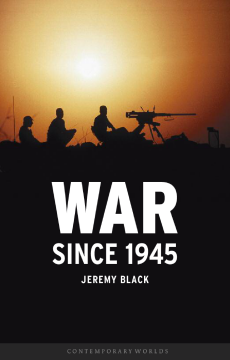
Additional Information
Book Details
Abstract
Most writing on modern warfare begins with the French Revolutionary Wars and continues through World Wars I and II, giving post-1945 conflicts only a cursory glance through the lens of Cold War politics. Distinguished military historian Jeremy Black corrects that imbalance with War since 1945, a comprehensive look at the many large- and small-scale wars fought around the world in the past sixty years.
Black argues strenuously that, in order fully to understand recent warfare, we must discard the Cold War narrative that has until now framed the majority of historical inquiry. By treating conflicts—especially those in and between developing nations—on their own terms, he is able to bring proper attention to the wide varieties of force structures, methods, goals, and military cultures that have been employed in post-World War II battles. Rather than recapitulate the familiar assessments that consider improvements in weaponry or increases in the size of armies without adequately weighing the wider context of their uses in specific wars, Black presents an account of warfare that focuses on the actual tasks the military is ordered to undertake. His global coverage of warfare is unparalleled, and his insistence on the centrality of developing nations to this period of military history brings new knowledge to bear on understudied aspects of recent history.
Black brings the book up to date with considerations of the current "war on terror" and the U.S.-led war in Iraq. Timely and accessible, War since 1945 will be essential to anyone who wants to understand the state of warfare in the present day.
"Jeremy Black is a scholar of courage and spirit."
— Vernon Bognador, Times Higher Education Supplement
"A detailed and invaluable guide to the variety of military experience since World War II . . . a good deal of very interesting information in this book on the evolution of war-fighting capabilities, from the development of nuclear deterrence at the beginning of the Cold War to the revolutionary changes brought by the increased application of computer networking and the advent of 'smart' munitions that can be targeted with greater precision and lethality. . . . Perhaps the most significant contribution of this slender volume . . . is the attention Mr. Black pays to the many conflicts that have not involved the Great Powers. . . . They provide a fresh context for understanding the nature and causes of war in the 20th and 21st centuries. . . . Mr. Black is a serious scholar in a field that is imperfectly understood outside a small fraternity of specialists. His accessible account of a deadly serious human activity deserves wider attention that it is likely to receive."
— Christopher Willox, New York Sun
"Many of Black's insights . . . taken together challenge a key component of the military revolutions/RMA paradigm: that Great Power wars are the driving force of modern military history. . . . As Black suggests, however, it may be time to consider new approaches and concepts to military history, if not an entirely new paradigm."
— Jefferson P. Marquis, Journal of World History
Jeremy Black is professor of history at the University of Exeter. His many books include Britain since the Seventies, Why Wars Happen, and Maps and Politics, the last copublished with the University of Chicago Press.
